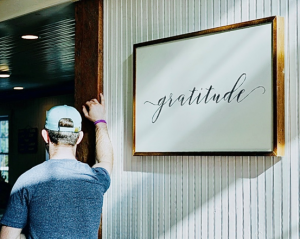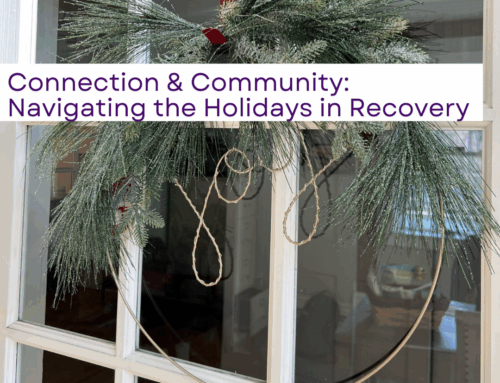 Gratitude is essential to early recovery, as it allows us to cultivate a mindset of positivity, resiliency, and hope. Did you know that gratitude has also been scientifically proven to increase happiness, self-respect, and self-esteem? Even the simple act of keeping a daily gratitude journal has been shown to increase long-term feelings of wellbeing and overall happiness.
Gratitude is essential to early recovery, as it allows us to cultivate a mindset of positivity, resiliency, and hope. Did you know that gratitude has also been scientifically proven to increase happiness, self-respect, and self-esteem? Even the simple act of keeping a daily gratitude journal has been shown to increase long-term feelings of wellbeing and overall happiness.
In early recovery, many people are working through damaged relationships, repairing ties to family and work, and working to overcome feelings of shame and remorse. Gratitude is the key to working through difficult times with a perspective of hope and possibility.
Gratitude is more than a feeling, however, it’s a practice. It is in the action of practicing gratitude daily that we rewire our brains and learn to find gratitude in any experience or situation.
The Benefits of Gratitude
Gratitude improves not just mental health, but physical health as well. In early recovery, our bodies are mending from the damage done by substance use, and it is more important than ever to practice self-care and allow ourselves to physically heal. Nurturing gratitude helps to:
- Reduce stress
- Lower blood pressure
- Build the immune system
- Improve sleep
- Reduce symptoms of depression
- Increase energy
The mental wellbeing associated with gratitude is well documented. Some of the mental and emotional benefits to a daily gratitude practice include:
 Increased resiliency: Resilience determines our ability to recover from stress, setbacks, and disappointment. When we practice gratitude regularly, we can put obstacles into the bigger picture and keep the rewards of recovery top-of-mind. This allows us to stay the course through all the ups and downs of early recovery.
Increased resiliency: Resilience determines our ability to recover from stress, setbacks, and disappointment. When we practice gratitude regularly, we can put obstacles into the bigger picture and keep the rewards of recovery top-of-mind. This allows us to stay the course through all the ups and downs of early recovery.
Improve positivity: Gratitude is the fuel for the engine that drives positivity. When we practice gratitude, we experience more feelings of joy, optimism, enthusiasm, love, and happiness. It also protects us from the challenging emotions of resentment, bitterness, envy, anger, and sadness.
Improve Self-Esteem: Gratitude makes us more aware of the blessings in our lives and more able to see the ways in which we are loved and cared for, even during challenging times. This, in turn, increases our self-esteem, self-respect, and self-love.
Increase connection: Studies have shown that grateful people have more social support. People are drawn to gratitude and are more inclined to reach out to help. The increase in happiness, self-esteem, positivity, and resiliency also make grateful people more apt to ask for help and want to be connected to others.
 Ways to Practice Gratitude
Ways to Practice Gratitude
There are many ways to weave gratitude into everyday life. Simple changes in mindset and routine are all that is needed to foster an attitude of gratitude. Some of the ways to practice gratitude include:
Focus on what you have, rather than what you don’t have. On particularly difficult days, this can be more challenging than it sounds, but there are always things to be grateful for – starting with your sobriety. This shift in focus helps to protect you from feelings of resentment, jealousy, regret, and shame which are toxic (and unproductive) in early recovery.
Give back to others. One of the best ways to foster gratitude is to do things for others. There are many ways to give back, including being present for someone who is struggling, offering rides or other services to people in your recovery circle, volunteering your time for a cause you care about, or even just brightening someone’s day.
Appreciate the simple things. In early recovery, there are a lot of larger challenges to work through, and it is possible to lose sight of the gifts – both large and small – of sobriety. A good night’s sleep, laughing with friends, taking in the beauty of a gorgeous day, or snuggling into a warm bed at night are examples of simple things to feel grateful for in recovery.
 Keep a daily gratitude journal. This is one of the best ways to actively practice gratitude in your daily life. Make time each day – first thing in the morning and right before bed are good times – to make a list of things you are grateful for that day. It doesn’t have to be a long list; even five things each day can make an astonishing difference in your mindset. Even if you’re struggling, there are always things to be grateful for, like a good friend, warm socks, a roof over your head, a good book, or a great meal, for example.
Keep a daily gratitude journal. This is one of the best ways to actively practice gratitude in your daily life. Make time each day – first thing in the morning and right before bed are good times – to make a list of things you are grateful for that day. It doesn’t have to be a long list; even five things each day can make an astonishing difference in your mindset. Even if you’re struggling, there are always things to be grateful for, like a good friend, warm socks, a roof over your head, a good book, or a great meal, for example.
View challenges as opportunities. One of the most amazing gifts of early recovery is that you discover all that you are capable of, the ways in which you are strong, and how you can overcome obstacles that previously seemed insurmountable. Every challenge is an opportunity to learn and grow if we remain open and grateful.
Practice mindfulness. Practicing mindfulness, or self-awareness is a great way to nurture gratitude. At its core mindfulness is being fully present for all life has to offer: the challenges as well as the opportunities. By weaving mindfulness into our daily lives, we are more aware of the gifts and blessings that come our way, and this allows us to be grateful for all the gifts of recovery.
 About Herren Wellness
About Herren Wellness
When you come to Herren Wellness, you are immediately connected with a thriving community of people at all stages of their recovery journey. We introduce healthy habits and routines centered around emotional, physical, and spiritual wellness that provide a solid foundation for rediscovering your interests, experiencing joy in sobriety, and building structure and routine.
We provide several alumni support communities, including a weekly recovery support group, monthly alumni meeting, and online alumni community you can access anytime. Your connection to Herren Wellness doesn’t end when your stay ends; we are there for you throughout your recovery journey.
If you, or a loved one, is looking for help, please call us at (844) 443-7736, email us at info@herrenwellness.com, or fill out a contact form. You are not alone.





